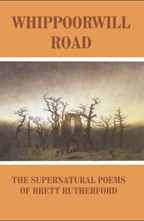The high house, unpainted timbers already
blackened, was Truth and Wisdom’s armoury,
walls thick enough to bar the arrow
of the hostile Indian, windows so high
and leaded panes so narrow so that no sin,
however faint, could penetrate
the dim, cool classroom. “In Adam’s Fall,
We Sinned All,” began the alphabet. The boys
stayed on until they could sum and call out
the hymn and credo of the Puritan Fathers;
the girls, few and tubercular, were such
as clung to knowledge for scant hope
of ever seeing a husband, spinsters
in waiting for the church pew, the rounds
of chaste charity, if they lived. The stooped
and spectacled teacher made silence,
obedience, and the occasional slap
of an ominous birch rod his syllabus.
One early autumn day, as darkness crept
with dankness into the unfired room,
he grew distracted from his lecturing
on the certainty of Hell by two distinct
aberrances: the clatter and fall
of chestnuts from a spreading tree
that had grown too close for comfort
to the schoolhouse, and the pale face
of Sarah, the oldest of his female charge.
Her agitation at his lecture, agitated him.
His hands began to tremble as he realized
she had come back from a necessity
(so long outdoors and back from the privy
he feared the wolves had taken her)
with a dark smear on her hands he realized
was woman’s blood.
She trembled, crouched
in her seat, her voice a scant whisper
as he required amens
and recitations.
When dusk came, and the boys hurtled
toward the broad pond, the trails among
the great trees canopied with vines,
the waiting farms and close houses,
Sarah moved slowly, raising herself with hands
protectively below her waist as though
she feared a trail might follow her, a lure
to bear and beast, a stain upon the landscape.
He blocked her passage. “Stay,” he said.
“Thou hast the mark of sin upon thee.”
She tried to dodge him; his hands reached out
and held her by the shoulder. Her blush
was like a bonfire. She could not speak.
He led her behind the schoolhouse. Silent
she was as he found a leaf pile and pushed
her down there. “Daughter of Eve,”
he cursed her as his mouth found her lips,
“Thou art man’s perdition.” She cried out;
the black boards of Hoxie House, the long
dark shadow of Truth and Wisdom’s armoury
muffling his groans and the tumult
of the lesson he taught her. That night,
she would close her primer forever,
and take the unbibled spinster’s vow.
No one would ever ask, and no one
would ever believe, how on the day
she bled first, she bled a second time.
On a quest with my friends David and Kleber for pre-1700 houses, we found the famous saltbox Hoxie House in Sandwich, MA. At some point in its history it had been a schoolhouse. I found its color and its stinginess of windows appalling, and this is the only house we saw that seemed to have an aura of evil about it. I instantly flashed onto the "imaginary" events in this poem, as I tried to imagine a repressed Puritan teacher locked up in this confined building with children.























